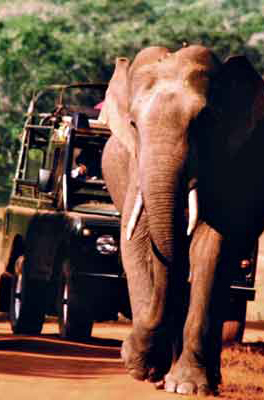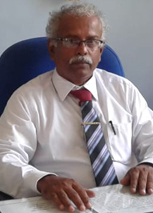Small and Medium Enterprises of Tourism in Sri Lanka (SME); a new Initiative by Sri Lanka Ecotourism Foundation (SLEF)
To position Sri Lanka as a Sustainable Ecotourism destination, the country needs the services of Small and Medium Scale Ecotourism Network, (SMEN) consisting of tour operators, hotel and lodge owners and Community Based Ecotourism Enterprises (CBEs)
As we are well aware, ecotourism is the very opposite of mass tourism. However, most of the mass tour operators and mass scale star class hoteliers conduct nature based tours under the pretext of ecotourism label in the protected and natural areas of Sri Lanka.
These mass tour operators are controlling most of the hotels, accommodation and transport facilities in Sri Lanka. Therefore, 45-60% of the income generated from the sustainable ecotourism products in the protected and natural areas is diverted in to the coffers of mass tour operators and 30-40% is retained at the hands of wealthy businessmen in the areas. Since 2001, the SLEF had been focusing in the socioeconomic issues confronted by the community in the traditional tourism generating areas in Sri Lanka. Since there has been no base at the moment for genuine ecotourism businesses and practices in the tourism generating areas of the island, the economic benefits derived by the nature-based tourism cannot be utilized for development of protected areas, cultural sites and well being of the local community. From the 'ecotourism products' in the protected and natural areas and the cultural and heritage sites, the communities get just little although they contribute to generate sizable income for the mass tour operators. The community living in and around the tourism generating areas more or less is providing casual labor and support services to the mass tour operators and developers. The tourism income generated in and around the cultural sites, protected areas and similar natural areas hardly retain in the locality. As a result, the economic leakage from the tourism generating areas of Sri Lanka is very high and counts at present in the region of 50-70% or more.
Therefore, it is essential that present marketing strategies which had been designed to promote mass tourism should be revamped to promote eco and sustainable tourism. Mass tour operators cannot cater to the needs of ecotourists as they require specialized services. It is a niche market that could be developed successfully, but marketing strategies of ecotourism vastly differ from sun, sea and sand destination promotional lines.
It is not wise to assign the mass tour specialists for ecotourism development, because, eco and sustainable tourism product and image is totally different from mass tourism. In this context, the challenge for Sri Lanka will be to develop Sri Lankan based tour operations with single owners catering to small groups rather than mass scale tour operations. The small-scale single owner tour operators are the best suited for quality of the product at local level. Ecotourism is a highly profitable niche market, which prevents economic leakages, and promotes incentives and benefits for the local community and the country in general.
In the light of this situation, Sri Lanka needs a genuine Small and Medium Tourism Organization to promote Ecotourism and Sustainable Tourism which could offer personalized services to genuine ecotourists. At present the government and the Sri Lanka Tourism Development Authority (SLTDA) offers various incentives and financial packages to mass tour operators. Similarly, the Ministry could extend the same facilities to small and medium scale tour operators, lodge owners and transport providers by encouraging Banks, Financial Institutions, Foreign Missions to support the SME sector with grants, affordable 'green loans', micro credit packages, duty free vehicles, tax concessions and other facilities to establish and develop their own businesses.
SME Tourism in Sri Lanka and initiative taken by the SLEF
As explained above, Small and Medium Enterprises (SME) Tourism sector is one of the most formidable tourism segments in Sri Lanka Tourism. It generates sizable income to Sri Lanka Economy by way of foreign exchange through tourism. It is an accepted fact that the tourism income generated by SME sector in a country does not drain back to generating markets abroad through the companies managed by local and foreign multinational tourism giants of main stream tourism sector. In Sri Lanka there are more than 5,000 (five thousand) SME tourism entities but most of the establishments are not registered with local authorities or Sri Lanka Tourism Development Authorities, (SLTDA).
Sri Lanka Ecotourism Foundation (SLEF), the pioneer national ecotourism society in Sri Lanka has been working hand in hand with the SME tourism sector in Sri Lanka for past 17 years (since 1998) and the SLEF was instrumental in lobbying for a SME Tourism Association in Sri Lanka since 2003. In 2003, Ecotourism National Policies, Guidelines and Strategic Action Plans were formulated by the Sri Lanka Tourist Board with the funding support provided by NORAD. SLEF was the only active member of the Steering Committee representing Ecotourism and worked with NORAD Team in providing valuable input to formulate the National Policies and the Guidelines in Ecotourism. Since the inception of SLEF in 1998, it was exploring the possibility of formulating 'Small and Medium Tourism Network' in Sri Lanka to cater to the Ecotourists visiting Sri Lanka, because, mainstream tour operators cannot cater to the needs of ecotourism as they require specialized services.
Ecotourism is a niche market that could be developed successfully but marketing strategies of ecotourism is vastly differing from conventional mass tourism promotion lines. The challenge for Sri Lanka will be to develop a strong SME tourism sector which will benefit Sri Lanka economy and bring a lot of direct benefits to the local community. In adhering to these important concepts, the SLEF in association with GTZ (Deutsche Gesellschaft für Technische Zusammenarbeit), German Organisation for Techinical Co-operation, explored the possibility of establishing a SME Sector for Tourism in Sri Lanka. Since 2004, SLEF worked hand in hand with GTZ and other likeminded individuals and organizations in Sri Lanka Tourism to introduce the concept of SME tourism in Sri Lanka. Almost after two years hard work, finally, in 2006, the Association of Small and Medium Enterprises in Tourism Sri Lanka (ASMET) was born and the SLEF President, Palitha Gurusinghe was appointed as the General Secretary. Though Palitha resigned from the post of General Secretary after two years he is still a Board Member of ASMET.
However it is regrettable to note that the ASMET has failed to deliver what it had promised to the SME Tourism Sector in Sri Lanka. It has terribly deviated from the original Vision, Mission and Goals.
When ASMET was born in 2005, SLEF was largely instrumental in conceptualizing its Vision, Mission, Long Term Goals, and Benefits for the Membership etc. Even the Official Logo of the ASMET was designed and developed by SLEF in consultation with GTZ. When the Organization officially came in to being in 2006, its Vision and Mission and Goals stood as follows.
VISION
" A united voice for small and medium enterprises for tourism in Sri Lanka; A tourism destination that is highly desired and greatly respected"
MISSION AND GOALS
• To share and implement best practices and experiences through linkages and joint strategies.
• To influence and secure improvement of the industry while protecting cultural heritage and environment.
• To gain awareness and responsibility towards society and the environment.
• To develop professional skills and respond appropriately to the needs of the industry.
• To participate in national and international trade promotional events and be competitive in the global market place through high quality and responsible tourism.
Unfortunately, what ASMET is doing now at present is only conveying the messages to the membership regarding the travel and trade fairs promoted by the Sri Lanka Tourism Development Authority (SLTDA). Majority of the membership does not take part in these Travel Fairs as the costs are beyond their means. The current Office Bearers of ASMET are clueless about the original Vision, Mission and Objectives of the Organization. Apart from that the organization does not focus or organize any activity that benefits the membership such as development of professional skills, education and training, certification, facilitation of financial assistance for their businesses, conducting programmes to update the knowledge base of members related to heritage/cultural and environmental conservation etc.
In the light of this situation SLEF has decided to formulate a SME sub-Sector within the SLEF itself with a view to support this important sector. Since the SLEF is working with a large number of establishments of SME Tourism Sector in Sri Lanka well over 17 years, it has decided to formulate a sub-sector of SME Tourism Division within the fold of SLEF. The main Objective of this sub-sector organization is to support SME tourism Sector to have a healthy dialogue with Sri Lanka Tourism Authority and to realize the business goals of the membership and address issues pertaining to their day to day and long term business issues and operations. The Vision of SLEF in embarking on this project is to position Sri Lanka as an outstanding destination for 'Sustainable Tourism in Asia' benefiting the Small and Medium Tourism Enterprises (SMEs) in Sri Lanka" and to promote small and medium scale tourism enterprises in Sri Lanka, serve better and offer personalized service for the national and international visitors who are willing to support the community and preserving and conservation of environment and cultural heritage of Sri Lanka".
The Primary Objective of SME-Sub Sector would be to focus on social and economic development of Sri Lanka through best practices of tourism and will take all possible steps to strengthening of the institutional capacity of the SME sector and its members. As the Long Term Goals, this Organization will support and provide guidelines to the SMEs to;
• Develop their tourism businesses in a sustainable manner to attract up market eco-friendly visitors.
• Support the SMEs by providing financial assistance through grants and micro finance facilities
• Develop cost-effective 'Eco Labeling System' for SMEs enabling them to offer their products and services to the national and international market in a more sustainable manner
• Establish SME branch organizations on district and regional levels so as to build up a close relationship with SME stake holders
• Involve SMEs members in National and International Training Programmes on the latest development of eco-friendly tourism products
• Secure support from Sri Lanka and World Tourism Organizations to develop the SMEs to an international standard
• Support the SME Members in devising new market opportunities through the web sites of SLEF, the mother organization
(SLEF will soon update this page with information on how to get the Membership of the Small and Medium Scale Ecotourism Network, (SMEN) and the benefits offered to the membership)




















